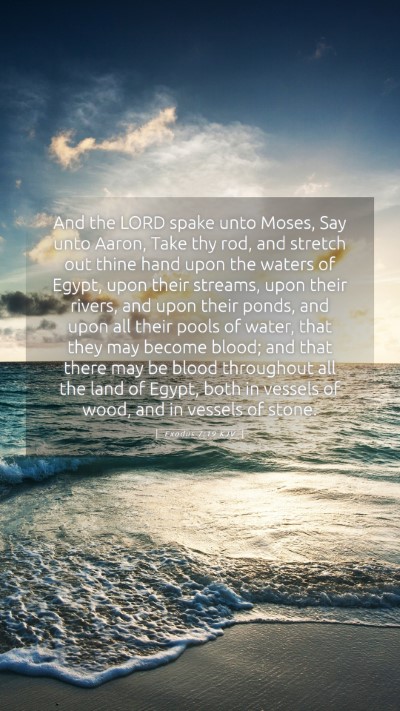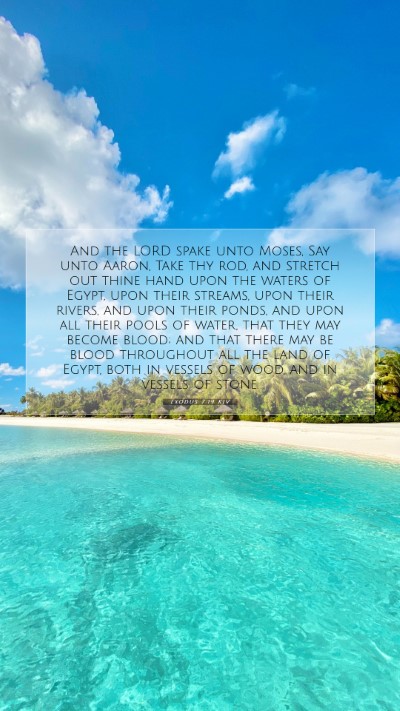Understanding Exodus 7:19
Exodus 7:19 offers a profound insight into the power of God displayed through Moses and Aaron during the Exodus. This verse is part of the narrative where God provides Moses with the signs and wonders that will demonstrate His sovereignty over Egypt and its gods. The verse states:
"And the LORD spake unto Moses, Say unto Aaron, Take thy rod, and stretch out thine hand upon the waters of Egypt, upon their streams, upon their rivers, and upon their ponds, and upon all their pools of water, that they may become blood; and that there may be blood throughout all the land of Egypt, both in vessels of wood, and in vessels of stone."
The following is a combined insight of various public domain commentaries on the meaning of this Bible verse:
Contextual Background
This verse is part of the initial plagues that God sent upon Egypt as a judgment against Pharaoh's refusal to let the Israelites go. It serves as a demonstration of God's absolute authority over creation, as He turned the life-giving waters of Egypt into blood.
Bible Verse Interpretations
-
Matthew Henry:
Matthew Henry emphasizes the miraculous nature of this act, presenting it as a direct challenge to the Egyptian gods associated with water. He notes that this plague not only affected the people but also their resources, underlining the severity of God's judgment. The turning of water into blood symbolizes the vital consequences of sin and disobedience to God's commands.
-
Albert Barnes:
Albert Barnes provides a detailed examination of the implications of the plague. He suggests that the transformation of the waters was a tangible sign of the consequences of sin not just for the Egyptians but for all who reject God. Additionally, Barnes discusses the symbolic significance of blood throughout the Bible, highlighting its importance in sacrifice and atonement.
-
Adam Clarke:
Adam Clarke delves into the historical significance of the plague, suggesting that it was a direct retribution against the Egyptians who worshipped water deities. Clarke points out that the water's transformation into blood serves as a metaphor for spiritual death resulting from disobedience. He also provides insights into the broader themes of deliverance and judgment prevalent throughout Exodus.
Significance of This Verse
The significance of Exodus 7:19 lies in its demonstration of God's power and authority over nature and false gods. It serves as a pivotal moment in the narrative of the Exodus, illustrating the consequences of Pharaoh's hardened heart and disobedience. The transformation of water into blood acts as a harbinger of the judgment that would follow if Egypt continued to resist God's commands.
Application and Relevance
Understanding Exodus 7:19 helps believers grasp the seriousness of God's call to obedience. As modern readers reflect on this narrative, it challenges them to consider how they respond to God's directives in their lives. The themes of judgment and deliverance resonate today, reminding the faithful of the importance of heeding God's call.
Related Bible Cross References
- Exodus 7:20-21 - The actual plague of water turning into blood.
- Exodus 12:12 - God's judgment upon the gods of Egypt.
- Psalm 78:44 - Recalling the plagues and their significance.
Conclusion
In summary, Exodus 7:19 highlights God's sovereignty and the seriousness of His judgments against those who oppose Him. Through careful examination of this verse, believers can gain deeper Bible verse understanding, enriching their Bible study insights. The narratives within Exodus serve not just as historical accounts but as spiritual lessons that apply even to today's life, reinforcing the timeless relevance of Scripture.


